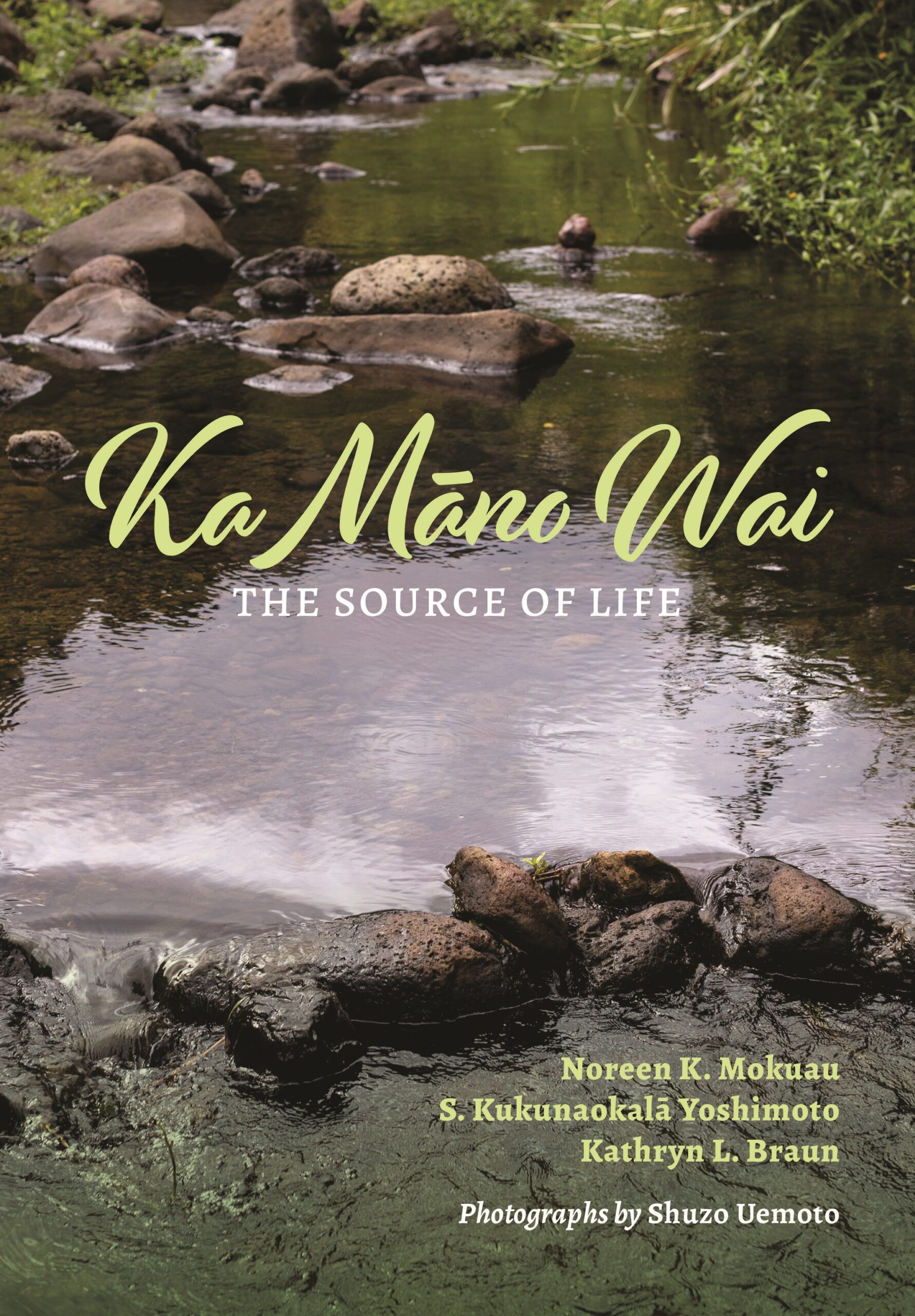Ka Māno Wai: The Source of Life
- About the Book
-
Ka Māno Wai is dedicated to the mo‘olelo (stories) of fourteen esteemed kumu loea (expert teachers) who are knowledge keepers of cultural ways. Kamana‘opono M. Crabbe, Linda Kaleo‘okalani Paik, Eric Michael Enos, Claire Ku‘uleilani Hughes, Sarah Patricia ‘Ilialoha Ayat Keahi, Jonathan Kay Kamakawiwo‘ole Osorio, Lynette Ka‘opuiki Paglinawan, Sharon Leina‘ala Bright, Keola Kawai‘ula‘iliahi Chan, Charles “Sonny” Kaulukukui III, Jerry Walker, Gordon “‘Umi” Kai, Melody Kapilialoha MacKenzie, and Kekuni Blaisdell are renowned authorities in specialty areas of cultural practice that draw from ancestral ‘ike (knowledge). They are also our mentors, colleagues, friends, and family. Their stories educate us about maintaining and enhancing our well-being through ancestral cosmography and practices such as mana (spiritual, supernatural, or divine power), mālama kūpuna (care for elders and ancestors), ‘āina momona (fruitful land and ocean), ‘ōlelo Hawai‘i (Hawaiian language), ho‘oponopono (conflict resolution), lā‘au lapa‘au (Hawaiian medicinal plants), lomilomi (massage), and lua (Hawaiian art of fighting).
The trio of authors’ own dedicated cultural work in the community and their deep respect for Hawaiian worldviews and storytelling created the space for the intimate, illuminating conversations with the kumu loea that serve as the foundation of the larger mo‘olelo told in this book. With appreciation for the relational aspect of Native Hawaiian culture that links people, spirituality, and the environment, beautifully nuanced photographic portraits of the kumu loea were taken in places uniquely meaningful to them.
The title of this book, Ka Māno Wai: The Source of Life, has multilayered meanings: in the same manner that water sustains life, ancestral practices retain history, preserve ways of being, inform identity, and provide answers for health and social justice. This collection of life stories celebrates and perpetuates kanaka values and reveals ancestral solutions to challenges confronting present and future generations. Nourishing connections to the past—as Ka Māno Wai does—helps to build a future of wellness. All who are committed to ‘ike, healing, and community will find inspiration and guidance in these varied yet intertwined legacies.
- About the Author(s)
-
Noreen K. Mokuau, Author
Noreen K. Mokuau is professor emerita
and former dean at the University of Hawai‘i at Mānoa Thompson School of Social Work & Public Health.S. Kukunaokalā Yoshimoto, Author
S. Kukunaokalā Yoshimoto is the executive director at Blueprint for Change and adjunct faculty at the University of Hawai‘i at Mānoa Thompson School of Social Work & Public Health.Kathryn L. Braun, Author
Kathryn L. Braun is professor of public health and social work and the Barbara Cox Anthony Endowed Chair in Aging at the University of Hawai‘i at Mānoa Thompson School of Social Work & Public Health.Shuzo Uemoto, Photographer
Shuzo Uemoto, photographer.
- Reviews and Endorsements
-
- In traditional Hawaiian society, the kumu loea would have been esteemed chiefs, kahuna, and warriors. Today, they are the leaders of our lāhui, and Ka Māno Wai honors them for their immense contributions to the preservation and perpetuation of Hawaiian culture and the growth of the lāhui. These moʻolelo strengthen our sense of pride in our cultural roots and will raise the aspirations of thousands of Native Hawaiians. This book inspires me and even at my ripe old age, makes me want to be a better Hawaiian.
—Stephen Kane-a-ʻI Morse, former executive director (2008–2021), Blueprint for Change - This aptly named book, Ka Māno Wai: The Source of Life, provides the reader with diverse Native Hawaiian philosophies. Interviews with fourteen kumu loea (expert teachers) provide different Native Hawaiian methods and practices for teaching and learning that enhance, accelerate, and extend Native Hawaiian culture and its pivotal role in ola (health and well-being) and social justice. You see and feel their tension and excitement, burden and joy, discipline and creative freedom, modesty and pride, humanity and moral integrity, and their hope, purpose, and commitment to serve their native people.
—Naleen Naupaka Andrade, MD, Executive Vice President of Native Hawaiian Health and Chief Diversity, Equity, Inclusion and Social Justice Officer at the Queen’s Health System
- In traditional Hawaiian society, the kumu loea would have been esteemed chiefs, kahuna, and warriors. Today, they are the leaders of our lāhui, and Ka Māno Wai honors them for their immense contributions to the preservation and perpetuation of Hawaiian culture and the growth of the lāhui. These moʻolelo strengthen our sense of pride in our cultural roots and will raise the aspirations of thousands of Native Hawaiians. This book inspires me and even at my ripe old age, makes me want to be a better Hawaiian.





